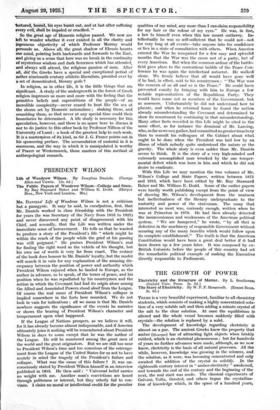PRESIDENT WILSON
Mn. Dame's' Life of Woodrow Wilson is not a criticism but a panegyric. It may be said, in exculpation, first, that Mr. Daniels worked in close friendship with the President for years (he was Secretary of the Navy from 1913 to 1921)
and never discovered any point of disagreement with his Chief, and secondly, that the Life was written under the immediate sense of bereavement. He tells us that he wanted to produce a story of the President's life " which might be
within the reach of the people while the grief at his passing was still poignant." He praises President Wilson's zeal for finding the right word as the vehicle of his thought, but his own use of words is very far from exact. The ecstasy
of the book does honour to Mr. Daniels' loyalty, but the reader will search it in vain for any explanation of the amazing dis-
crepancy between the position of power and authority which President Wilson enjoyed when he landed in Europe, as the author in advance, so to speak, of the terms of peace, and his
position when he was repudiated by his countrymen and the nation in which the Covenant had had its origin alone among the Allied and Associated Powers stood aloof from the League.
Of course the real cause of President Wilson's collapse is implied somewhere in the facts here recorded. We do not look in vain for indications ; all we mean is that Mr. Daniels
nowhere suggests the significance of the events he narrates or shows the bearing of President Wilson's character and temperament upon what happened.
If the League of ,Nations prospers, as we believe it will, for it has already become almost indispensable, and if America ultimately joins it nothing will be remembered about President Wilson in days to come except that he was the author of the League. He will be numbered among the great men of the world and the great originators. But we are still too near to President Wilson's time and too conscious of the estrange- ment from the League of the United States for us not to have acutely in mind the tragedy of the President's failure and collapse. What was the cause of this failure ? It was un- consciously stated by President Wilson himself in an interview published in 1913. He then said : " Universal belief carries no weight with me. Another man's convictions are heard through politeness or interest, but they utterly fail to con- vince. I claim no moral or intellectual credit for the peculiar qualities of my mind, any more than I can claim responsibility for my hair or the colour of my eyes." He was, in fine, a law to himself even when this law meant outlawry. In- tellectually he was so self-sufficient that he could not—not for very long at all events—take anyone into his confidence or live in a state of consultation with others. When America entered the War he recognized for a few easy and splendid months that the War was the cause not of a party, but of every American. But when the common ardour of the battle- field gave place to the contentious babble of the Peace Con- ference he was again the intellectual autocrat. He walked alone. We firmly believe that all would have gone well if he had, in effect, said to his countrymen : " The War was the concern of us all and so is the Peace." He could have prevented enmity by bringing with him to Europe a few notable representatives of the Republican Party. They would have come not as members of the Government, but as assessors. Unfortunately he did not understand how to placate, and when he returned home he found the nation already misunderstanding the Covenant and determined to show its resentment by continuing in that misunderstanding. Many other facts recorded in this Life might be cited to the same effect, as for instance the dismissal of Mr. Lansing, who, so far as we can gather, had committed no greater treachery than to consult his colleagues of the Cabinet about what ought to be done when the President was laid low by an illness of which nobody quite understood the nature or the gravity. The whole story is even sadder than Mr. Daniels seems to think. It is the story of a very high-minded and extremely accomplished man wrecked by the one temper- mental defect which was born in him and which he did not desire to eradicate.
With this Life we may mention the two volumes of Mr. Wilson's College and State Papers, written between 1875 and 1913, which have been edited by Mr. Ray Stannard Baker and Mr. William E. Dodd. Some of the earlier papers were hardly worth publishing except from the point of view of showing Mr. Wilson's development from the neatness but ineffectualness of the literary undergraduate to the maturity and power of the statesman. The essay that interested us most was, curiously enough, written when he was at Princeton in 1879. He had then already detected the inconveniences and weaknesses of the American political system. " We are hampered," he wrote, " by all that is defective in the machinery of responsible Government without securing any of the many benefits which would follow upon its complete establishment." The truth is that the American Constitution would have been a great deal better if it had been drawn up a few years later. It was composed by ex- British Colonists before the people of this country had set the remarkable political example of making the Executive directly responsible to Parliament.


































 Previous page
Previous page